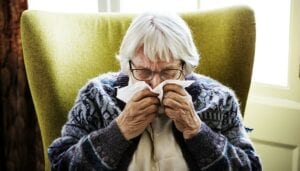The Coronavirus (COVID-19)
 What we know as of 3/1/20. COVID-19 is spread much like the regular flu—through coughs and sneezes that put droplets in the air and on surfaces. It may be 2–14 days after exposure before a person has symptoms. That means people can spread the virus without knowing it. And many have symptoms that seem much like a cold, so they don’t think to alter their behavior.
What we know as of 3/1/20. COVID-19 is spread much like the regular flu—through coughs and sneezes that put droplets in the air and on surfaces. It may be 2–14 days after exposure before a person has symptoms. That means people can spread the virus without knowing it. And many have symptoms that seem much like a cold, so they don’t think to alter their behavior.
The good news is that 81% of those who get COVID-19 seem to have a fairly mild case—between a cold and the seasonal flu. But 14% of those infected have a severe case, involving pneumonia and low blood oxygen levels. About 5% have a critical case involving respiratory failure, septic shock, or multiple organ failures.
So far it appears that only 2%–4% of those who get COVID-19 actually die. Scary as that sounds, bear in mind that means 96%–98% recover fully. Just like the seasonal flu, frail older adults and persons with respiratory problems, such as COPD, are hit the hardest.
Planning
As a family caregiver, plan ahead just in case:
- Prepare to work at home. Talk to your employer about contingency plans. You may need to stay home to care for someone who is sick, or for children if schools are closed.
- Designate a separate room and bathroom for persons in the household who become sick.
- Make a list of emergency contact people (doctors, pharmacists, friends, family, local hospitals). Also, bookmark the online Centers for Disease Control and Prevention (CDC) coronavirus page (cdc.gov/coronavirus/2019-ncov/). And find your regional public health department website (naccho.org/membership/lhd-directory) for local updates.
- If the person you care for does not live with you, plan how he or she will get medicine, food, and supplies during an illness or potential lockdown. Also, who might monitor their condition and call the doctor, or 911, should illness occur.
Testimonial (Dennis, SCM): “It sure helps to know how I can plan ahead. Also how to prevent getting this virus, and what to do if we do get it.”
Read More About the Virus Here
- Ensuring a Smooth Transition From Hospital to Home - June 4, 2025
- Caregiver of the Month – June 2025 - June 2, 2025
- Common Sense Summer Tips for Seniors to Help Them Beat the Heat - May 28, 2025

